The Break of Day
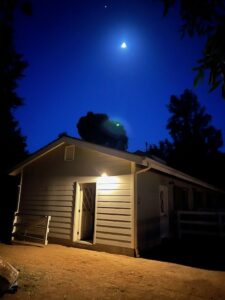
I wake up at 5 a.m. to feed the horses. Every day.
It started during a hot spell. The mercury climbed into the 90’s by 10 each morning, so we had to ride early to beat the heat. To give the horses time to eat their breakfast before we left the barn, they had to be fed by 6, but Marino, the man who feeds them for me, doesn’t show up until 8:30. My choices were to stay out of the saddle, force the horses to lug us around hungry and pissed off, or feed them myself.
It felt like I’d been asleep about ten minutes when my iPhone’s night owl ringtone woke me that first morning. I crawled out of bed in the dark, dressed, and staggered downstairs to the truck.
I stall five horses in two barns, which I named Olive and Herbert for shorthand reference. Olive is located across Long Valley Road from the Hidden Hills Community Center, a two-minute drive from my house. Dawn broke as I parked in the lot next to the center’s swimming pool. A slim elderly woman wearing black goggles swam laps in a lane marked with a floating blue and red rope line. Groggy from the early rise, I sat comatose in the truck, watching her slide through the water, slow and steady, up and back.
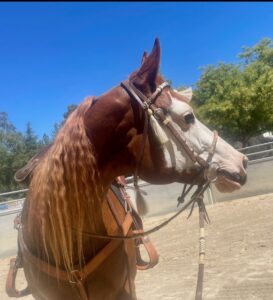
A shrill neigh broke the trance. Across the street, Jackson, Lily, and Dolly stood in their turn-out corrals staring at my truck with their ears pricked forward, wondering what Carrot Man was doing there at 5:30. They watched me intently as I climbed out of the truck and walked through the gate. When I headed to their stalls with an armload of hay, they began to celebrate, prancing and tossing their heads.
Jackson is a solid chestnut with a white blaze on his face and three white socks. He’s smart, well-trained, and a professional, reliable ride. A big, beautiful paint with a white face and white splotches on her body, Dolly lives up to the name on her registration papers, ShesATotalDiva.
Drawn to Lily that morning, I stood at her stall door and watched her eat. A gray flea-bitten (black speckles) Azteca mare with a pretty mane and lush white tail, she bears deep physical and psychological scars from her previous owner’s abuse. Because of injuries that didn’t heal right, she favors her left shoulder and struggles on downhill grades.
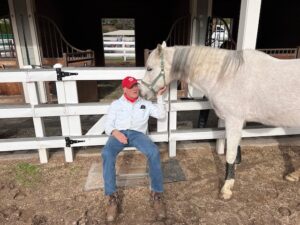
Lily raised her head and looked at me. She was afraid of me when I bought her. Now, her soulful eyes look at me with hard-won trust and a touch of love. All my horses tug at my heart, but sometimes, like that morning, Lily tugs a little harder.
I pulled myself away from Lily and drove to Herbert. It sits on a hilltop a couple hundred yards from Olive. Marge and Wilson stood at the fence beside the road and watched Carrot Man’s truck climb the steep driveway to the barn. When I opened the door to the feed room, they realized why I was there and galloped up the hill to their stalls.
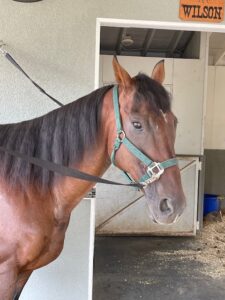
Wilson is a bay thoroughbred in his twenties, a good soul who tries his best to do whatever you ask of him. I retired him from riding when arthritis attacked his spine. In January problems with his front hooves got so bad I thought I’d have to put him down, but he rescued me from that heartbreaking decision, miraculously fighting his way back to good health under the care of a smart, innovative vet. I’ve written often in these pages about my friendship with Wilson. See Riding Wilson, Stay with Me, and For the Love of Horses.
Wilson’s stablemate, Marge, is a little sorrel quarter horse mare, perky, mischievous, and funny. Despite her size, she tries to dominate other horses, forever laying back her ears and baring her teeth at them, but her aggressiveness doesn’t carry over to people. She loves my grandchildren. And Carrot Man, when he remembers to bring the carrots.
In the coop behind Herbert, the rooster crowed a greeting to the sunrise and tall pines cast long blue shadows across my path as I walked back to the truck to go home.
The ride went well that day, and the early rise put me to sleep at 9 that night, which made the next morning’s 5 a.m. ringtone less jarring.
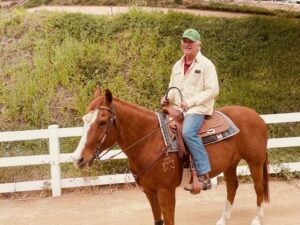
I fed the horses every morning during the hot spell. The morning after it subsided, I didn’t set the alarm, but my body clock woke me at 5 anyway. I lay in the dark staring at moon-shadows, thinking about the horses. Their body clocks had adjusted to the early feeding, too, I thought. They’d be disappointed when I didn’t show up. It didn’t sit well with me. I got up and drove to the barns. The next morning, I fed them again. And the next.
Weeks passed. September brought shorter days. It remained pitch dark all the way through the feeding. I had to carry a flashlight to find the hay. The mornings grew cold in October. I donned a heavy coat, gloves, and a muffler.
Six months into it now, my mornings have taken on a consistent rhythm. I rise at 5 and climb in the truck. My headlights wash over Pedro feeding Tommy and Ziggy in a corral on Round Meadow. He grins and waves to the crazy old man who feeds his own horses. I wave back. Steam rises from the heated pool at the community center. The gray-haired swimming lady slides through the water, up and back. She glances at me through her goggles and raises an arm mid-stroke in greeting. I tip my hat. I cross the street to the haystack. Jackson nickers. Lily and Dolly prance. Manuel walks a tall roan down Long Valley Road in the moonlight. “Good morning!” he shouts. I shout back. Marge and Wilson stampede up the hill to Herbert, plumes of vapor jetting from their nostrils. The rooster crows. I walk through pine-shadows to the truck and drive home.
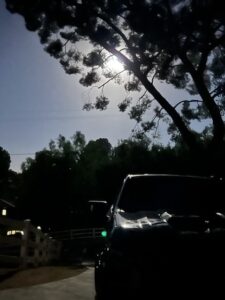
I never miss a morning. Even in the bitter cold, rain, or high winds, and once during a rare thunderstorm, I feed the horses. I don’t have to do it. I still pay Marino for the early feed, but I don’t let him do his job. Sometimes, especially on those rough weather days or when I’m not feeling well, I wonder why I’m out there.
Part of the reason may be a throwback to my youth. When I was a teenager in White Hall, I helped a friend spread hay in the field for his cattle before dawn on cold winter mornings. He drove a truck pulling a trailer into the pasture. A hundred cattle lumbered toward us, lowing, a dusting of snow riding their backs, the lead cow, Horn, in front, the others stringing out behind her. I stood in the trailer-bed kicking haybales off the back end. One by one the cattle dropped out of line to feed. Something about it – the lowing cattle, the discipline of the work, the serenity of the cold snowy dawn – centered me and eased my adolescent insecurities, at least while I was there. The ghost of that old feeling sometimes swirls around me before dawn at Herbert and Olive.
Another reason I’m there may be a need to feel useful. In big law and big business, I worked long hours confronting myriad challenges. Retirement was like dropping out of existence. Suddenly, no one needed me to do anything. I was lost for a while. I found a purpose in writing, but it’s a solitary vocation. You live inside your head; you work because you want to; and no one really needs you to tell your stories. The horses need me. They depend on me to show up, and they’re glad to see me when I arrive.

Susan, who boards two paints in a barn off Round Meadow and the only other owner I know who feeds her own horses before dawn in Hidden Hills, offered another reason. “It’s quiet early in the morning when no one’s around. It’s the best time to bond with your horses.”
These things all play a role in my early morning regimen, I guess, but I tend to overthink things. Cindy usually cuts to the chase.
“I don’t understand why I get up every morning to feed the horses,” I told her. “It’s Marino’s job. It makes no sense for me to do it.”
“It makes perfect sense,” she said. “You love the horses. It makes you happy to start your day with them. That’s why you do it.”
I would never have predicted I’d be rising at dawn every day without fail in my 76th year to feed horses, but this is where I find myself today, and my auburn-haired blind date is right about why. I’m in a good place; it’s where I want to be; and it makes me happy.



December 4, 2023 @ 8:01 am
The horses reach into your soul. They need you like you need them — it’s a mutual love affair that keeps you and them in tune with your and their lives. It’s great that you are still able to interact with them, both mentally and physically. Keep the stories coming!
December 5, 2023 @ 7:07 am
Thanks, Randy! You said it better than I did.
December 2, 2023 @ 3:33 pm
Wonderful, Ken. You’re feeding more than your horses!
December 3, 2023 @ 7:20 am
Thanks so much, Bob. That’s a beautiful thought. It means a great deal to me.
December 2, 2023 @ 9:07 am
Sorry, Ken, but you are wrong. I need your stories, and I’m pretty sure I am not alone.
December 3, 2023 @ 7:19 am
Thanks, Gay. That wasn’t a response I expected from this post, but it made me feel great, especially coming from an author I respect and admire. It means the world to me.
December 2, 2023 @ 7:20 am
Ken, what a restful and loving picture you paint. Tho’ I’m still snug in my bed at 5am, I can still feel the quiet and calm you describe. And I know the horses love their time with The Carrot Man❣️
December 2, 2023 @ 8:23 am
Thanks, Susan. It’s a quiet, peaceful time. A good way to start the day.
December 2, 2023 @ 3:54 am
What a peaceful, purposeful, piece of writing!!💕 ALMOST made me want to hop out of my warm bed. However, I do not have horses now…or a dog! Perhaps my dog search will end and I’ll experience part of what you feel each morning. Love your sharing of your life through your writing!
December 2, 2023 @ 6:38 am
Thanks, Betty Lou! Hope you find a dog soon. Lately it seems dogs and horses are my best friends.
December 1, 2023 @ 7:57 pm
Great story Ken!
It was gratifying to hear of someone else who now still gets up at 5.00AM when they don’t have to! I feel it is the best time of the day to be with nature which is kind of the same thing I think I hear you saying. There is also something about a sunrise…….
December 2, 2023 @ 6:35 am
Thanks, Gary. Glad to know you’re up, too. And you’re right about the sunrise.
December 1, 2023 @ 3:29 pm
Wait! No one told me about a 5 am wake up call!! You know that’s 2 AM on the east coast (ok, I know it’s not but that’s beside the point!).
Awesome post. Amazing how your words convey so much feeling and emotion.
December 1, 2023 @ 4:57 pm
Thanks, Lucian! You don’t have to answer the bell for the morning feed, but the horses will know.
December 1, 2023 @ 12:49 pm
As always I love your stories! ❤️
December 1, 2023 @ 2:39 pm
Thanks, Sonja! Your encouragement means the world to me.
December 1, 2023 @ 12:38 pm
Every time I read one of your stories
They bring tears to my eyes and tugs at my heart …so glad you have the horses
It’s a great joy to me
Thank you 🙏
December 1, 2023 @ 2:39 pm
Thanks, Janet. Well, you made a lot of it happen!
December 1, 2023 @ 12:04 pm
All of the above. <3 Love it.
December 1, 2023 @ 2:38 pm
Thanks, Pamela!
December 1, 2023 @ 11:54 am
We all want to be needed and loved. You are getting this from your horses. As we age it is harder to get this attention. Our kids are grown, We no longer are needed at work. Ken you are lucky to have found this love and affection from your horses. God bless you.
December 1, 2023 @ 2:38 pm
Thanks, Alice. You’re right about all this. You said it better than I did!
December 1, 2023 @ 10:59 am
I loved loved reading your sweet time in the morning. The quiet mornings are my favorite time of the day. I talk to my dog instead of the horses. Keep savoring every morning with them.😊😊. Barbara
December 1, 2023 @ 11:40 am
Thanks, Barbara. It is a special time.
December 1, 2023 @ 10:47 am
Wonderful piece, as usual!
December 1, 2023 @ 10:55 am
Thanks, Cindy. When you gonna start getting up at 5 to feed Red?
December 1, 2023 @ 10:13 am
Good habits breed something. I don’t remember. But I know that good habits are good and that horses are better. Especially Dolly. And look at you with your fancy tech marketing of your books!
December 1, 2023 @ 10:58 am
I think the quote is “Good habits breed success.” If success is doing something that makes you happy, I guess it’s working. As for the tech marketing, It ain’t me. World Class publishing assistant, Bobbye Marrs, handles all that stuff. I have no idea how she does it.
December 1, 2023 @ 11:27 am
Well, I bought one of your books a few years ago. I must have been lured by her cyber-guile.
December 1, 2023 @ 11:41 am
That’s the idea. Impulse purchasing.